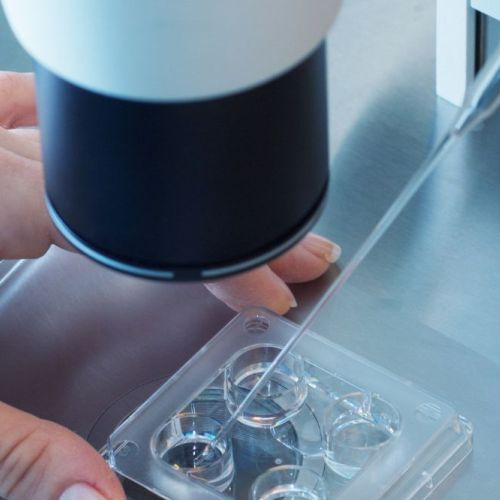Understanding Egg Quality and Testing

At California Center for Reproductive Health, we’re committed to helping you overcome the challenges of infertility. Much of our success depends on the health of your available eggs. Our testing protocols help us understand your egg quantity and quality, so that we can provide you with the best treatment options.
Many factors can affect your ability to become pregnant. Both the quantity and quality of the eggs produced within your ovaries are vitally important. It’s sometimes hard to separate one from the other, but quality may matter even more than quantity when it comes to fertility issues.
Follicles are the fluid-filled sacs in your ovaries that contain immature eggs. Hormonal influences during your menstrual cycle cause a follicle to mature and release its egg. During a natural cycle, typically only one egg is released for fertilization.
If you have follicles in your ovaries, we can use medication to help manipulate or entice these structures to mature the eggs they hold. We can then collect or “harvest” the eggs for in vitro fertilization (IVF) or freeze them for future use.
Sometimes, however, abnormalities within the eggs themselves can prevent a successful pregnancy, regardless of how many eggs we might capture. Heredity, aging, illness, and some medical treatments for diseases, such as cancer, can slow your production of eggs. These factors can also cause chromosomal abnormalities in your eggs which may result in failure of fertility treatments or lead to a miscarriage.
And because we’re dedicated to helping you achieve your dream of becoming pregnant as well as carrying a pregnancy full-term, we focus on the potential quality as well as the quantity of eggs available in your ovaries.
Starting with the basics
When you’re having difficulty with fertility issues, our first consideration of potential problems with your egg quality and quantity is your age. For most women, fertility declines slowly until you reach 30. At that point, declines in egg quantity and quality begin to accelerate quickly and continue declining through your 30s and early 40s.
Every case is unique, but older women have a much greater risk of producing eggs with abnormal chromosomes and may have no chance of producing viable eggs after 45. It’s why we generally recommend women who have chosen to delay pregnancy but want to store eggs for future use consider freezing their eggs by age 30-35.
The hormonal factor
Blood tests that measure hormones related to your reproductive cycle can often point to the reason for your infertility and give us helpful information regarding the quantity and quality of your eggs.
We start with testing your levels of follicle stimulating hormone (FSH) on the third day of your menstrual cycle. FSH helps control your egg production. When you have a high FSH level, you may have low egg quality and quantity.
Estradiol is another hormone we check via a blood test on day three, because it’s a form of estrogen and the primary female sex hormone. A high estradiol level may suppress your production of FSH. This can curb your ovaries’ ability to produce mature eggs and may make it difficult for you to respond to fertility medications. Low estradiol levels sometimes indicate conditions that can interfere with your ability to conceive, including polycystic ovary syndrome (PCOS).
Another hormone we’re interested in is your anti-Mullerian hormone (AMH). It’s the hormone produced by dormant follicles in your ovaries, and we use it to assess your ovarian reserves – the number of eggs you have left. AMH is not affected by your menstrual cycle, so we can check your level at any time.
Depending on other test responses, we may recommend a Clomid challenge test. For this study, we ask you to take Clomid, a fertility medication, for several days and then recheck your FSH. If your FSH levels don’t respond adequately to the Clomid, your eggs may be low in quality and quantity and decrease your response to fertility medications used with IVF.
We might also recommend a transvaginal ultrasound to check your ovarian reserves. This painless and simple study uses ultrasound technology to capture an image of the resting follicles in your ovaries. A high number is often a good indicator of egg quality and quantity.
Any testing we do regarding the quality and quantity of your eggs is designed to ensure we create the most effective fertility treatment plan available for your circumstances. Fertility treatments are costly and time-consuming. The process can also, understandably, affect your emotional well-being.
We feel we owe our patients the best chance available for a positive outcome, and we use our extensive skill and expertise with infertility issues to help facilitate that. Egg quality testing helps us accomplish our goal. And if your eggs aren’t viable, we can save you the pain of “hit-and-miss” treatments that carry a high failure rate by recommending you consider egg donation with IVF.



